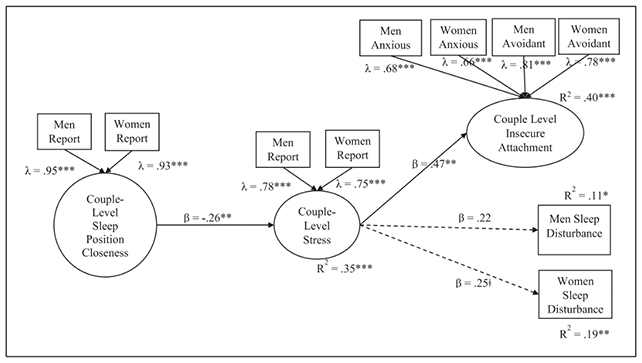A bedtime cuddle with your partner could make a real difference to your feelings of stress and security, according to a new study closely analyzing the relationship between physical touch and well-being in a relationship.
The main takeaway: nighttime cuddles (more intimate sleeping positions) were linked to lower levels of stress in couples, which then in turn led to stronger feelings of attachment and security in the relationship.
According to the study researchers, psychologist Josh Novak and cognitive development researcher Kaleigh Miller from Auburn University in the US, cuddling in bed could offer an easy, free way to boost mental health and relationship quality.

"Although the present data was cross-sectional and future research is needed, physical closeness at sleep onset may be a promising and amenable avenue for improving relational and physiological well-being," write the researchers in their published paper.
It's been well established that physical affection has the potential to boost our well-being in all kinds of ways, and here the researchers wanted to take a detailed look at how couples positioned themselves at the start of bedtime.
Information was collected from 143 mixed-gender, heterosexual, bed-sharing couples, with an average age of 43 for the men and 40 for the women. On average, these couples had been together 13 years, with one pair approaching 30 years together.
While individual preferences for sleeping positions didn't match up with the positions the couples took at the start of the night, closer positions – so couples spooning, sleeping intertwined, or sleeping face-to-face – led to the described psychological benefits.
"This finding may suggest that individual sleep position may not be a driver or a factor in how a couple chooses to cuddle at night and rather is driven by a desire or need to be close to one's partner," write the researchers.
There are some limitations to think about here: the study only looked at a single snapshot in time at the start of the night, through self-reported data, so cause and effect shouldn't be assumed. The researchers acknowledge that the cuddles-to-security association probably works both ways, to some extent.
The other obvious caveat is that we're all different when it comes to responding to physical touch in intimate relationships, and that sharing a bed with another person has many different effects on us.
Important variables such as age, relationship length, and whether or not any children or pets were regularly in the bed were factored into the statistics, helping to isolate the influence of sleeping position at the start of the night.
The research is also interesting in the associations it didn't find: for example, there was no apparent connection between physical intimacy at the start of sleep and subsequent sleep quality – so physical intimacy doesn't necessarily mean improved slumber. This is something future studies could follow up on.
"Perhaps intimate positions are disruptive of sleep because sustaining long cuddling positions may be uncomfortable, may increase body temperature, one or both partners have sleep problems or disorders, or a myriad of other reasons," write the researchers.
The team concludes with what many people may already be familiar with firsthand – a brief cuddle while you're falling asleep could be enough to gain those psychological benefits, before you both roll over and settle into your preferred sleeping positions for the night.
The research has been published in the Journal of Social and Personal Relationships.
